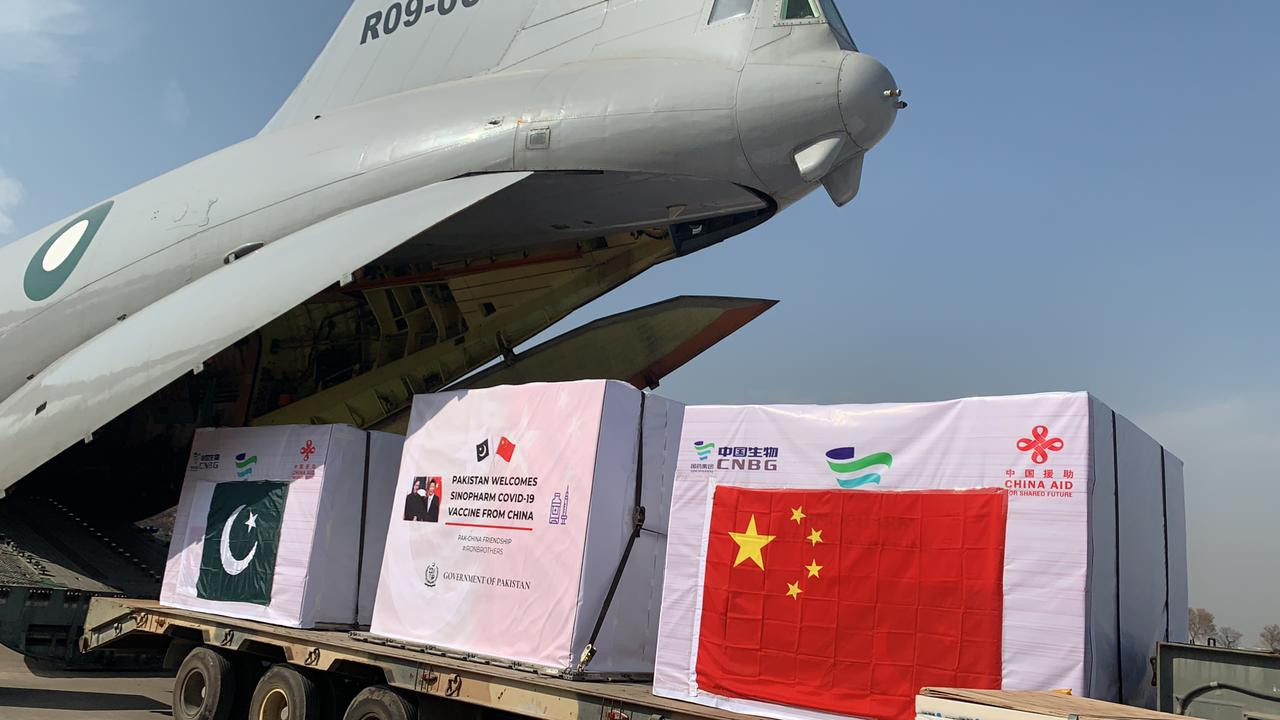
First batch of CanSino Covid-19 vaccines arrives in Pakistan
Single-dose Chinese jab is 74.8% efficient in preventing coronavirus and 100% efficient at preventing severe disease
ISLAMABAD:
Pakistan received the first shipment of the single-dose Covid-19 vaccine produced by China’s CanSino late on Tuesday, as the government prepared to receive one million more doses of Sinopharm vaccine this week, officials said.
The first shipment of the imported vaccine landed as the third wave of Covid-19 pandemic intensified in the country, which has seen more than 4,000 new infections every day since the past couple weeks. According to the latest data on Wednesday, the single-day tally of fresh cases stayed above 4,500.
On Tuesday, Minister for Planning Asad Umar, who leads the government anti-pandemic strategy, had said: “We will be getting the bulk vaccine by mid-April from CanSino from which three million vaccine doses can be made.”
The first batch, which has been purchased by Pakistan from China, included 60,000 doses of the vaccine. The CanSino Biologics Inc told a Chinese news agency that the vaccine is expected to facilitate in building immunity in the Pakistani society.
Pakistan started the vaccination campaign in February with doses donated by the government of China. The campaign started with frontline healthcare workers and then inoculation of the senior citizens in the second phase.
“In order to continue [vaccination], we need more batches of the vaccine so that we can administer doses to the remaining citizens. Today, we have received the first batch of the vaccine which we have purchased,” Special Assistant to Prime Minister on Health Dr Faisal Sultan, said.
“In addition, we have a second vaccine called the Sinopharm, the one with which we began our vaccination campaign. Today we have received half a million doses of this vaccine and we hope to get another half a million tomorrow.”
Read more: First batch of Covid-19 vaccine arrives in Pakistan
During the ongoing vaccination campaign, some 800,000 jabs have been administered, according to Dr Sultan. In April, May and June, the government plans to purchase millions of doses to continue the inoculation drive.
From March 30, the government broadened the scope of vaccine recipients, starting the registration of people over the age of 50. “We are expediting the process so that a very high number of people are vaccinated so that we can curtail the spread of the pandemic.”
Dr Sutlan thanked the Chinese government for helping Pakistan in its fight against the pandemic. “The role of China in our effort against Covid is immensely plausible,” he said. “They [China] also helped us by donating vaccines.”
About the CanSino vaccine, the Dr Sultan said that it required a single dose, adding that it was particularly useful for the elderly, who did not have to visit vaccine centres multiple times. “Also it is effective,” he added.
The de fact health minister allayed concerns regarding reaction of the vaccine, saying that the country had good trials of CanSino jabs and that the government was monitoring any reactions from the vaccines.
“When vaccines are used in millions there must be some cases of reactions and sometimes people who get the vaccine may have a pre-existing medical condition. However, we have good trials and we are also monitoring any reactions,” he said.
“The demand for the vaccines is higher than the supply, due to which the arrival of AstraZenaca is delayed. As a result, we have started the use of Chinese vaccines. In April, May and June, millions of more vaccines are to be procured to vaccinate over 100 million people above the age of 18.”
Dr Sultan warned that the third wave of the pandemic has become challenging, particularly in Khyber Pakhtunkhwa (K-P), Azad Jammu and Kashmir (AJK) and Punjab. He encouraged people to vaccinate themselves and observe the standard operating procedures (SOPs).
Since the onset of March, Pakistan remains in the grip of the third wave of the pandemic driven by the UK strain of the virus. In the previous month, the National Command and Operation Centre (NCOC) reported close to 90,000 cases and more than 2,000 fatalities.
The NCOC – the nerve centre of the government’s synchronised effort against the pandemic – said the number of total active Covid-19 cases topped 50,000, as 4,757 more people tested positive for the virus, 78 patients died during the last 24 hours.
According to the official data, 2,848 people recovered from the disease during the last 24 hours, taking the number of total recoveries to 603,126. However, the number of active cases rose to 50,397, including 3,912 admitted to various hospitals across the country.
The NCOC daily update said that 78 patients, including 73 in hospitals, died during the last 24 hour, adding that most of the deaths occurred in Punjab, where 46 patients breathed their last, followed by Khyber Pakhtunkhwa (K-P) where 23 patients died.
With the latest fatalities, the nationwide death toll from Covid-19 rose to 14,434 – 4,497 in Sindh, 6,365 in Punjab, 2,342 in K-P, 568 in Islamabad, 207 in Balochistan, 103 in Gilgit-Baltistan and 352 in Azad Jammu and Kashmir (AJK).
The pandemic broke out in the country in February last year. Since then a total of 667,957 people have been affected. Out of them 603,126 people made full recovery, making a significant recovery ratio of over 90%.
The highest number of Covid patients has been recorded in Sindh where 265,433 were infected, followed by 220,392 in Punjab, 87,055 in K-P, 57,833 in Islamabad Capital Territory, 19,557 in Balochistan, 12,663 in AJK, and 5,024 in G-B.
(WITH INPUT FROM NEWS DESK)
1730577492-0/Express-Tribune-Web-(26)1730577492-0-270x192.webp)



1730543683-0/Express-Tribune--(3)1730543683-0-270x192.webp)










COMMENTS
Comments are moderated and generally will be posted if they are on-topic and not abusive.
For more information, please see our Comments FAQ